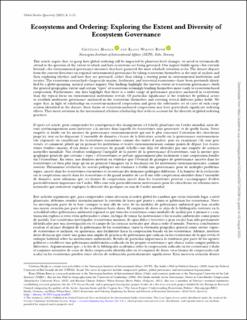| dc.contributor.author | Maglia, Cristiana | |
| dc.contributor.author | Rowe, Elana Wilson | |
| dc.date.accessioned | 2023-08-04T08:07:00Z | |
| dc.date.available | 2023-08-04T08:07:00Z | |
| dc.date.created | 2023-06-29T13:27:12Z | |
| dc.date.issued | 2023 | |
| dc.identifier.citation | Global Studies Quarterly. 2023, 3 (2), 1-11. | en_US |
| dc.identifier.issn | 2634-3797 | |
| dc.identifier.uri | https://hdl.handle.net/11250/3082581 | |
| dc.description.abstract | This article argues that, to grasp how global ordering will be impacted by planetary-level changes, we need to systematically attend to the question of the extent to which and how ecosystems are being governed. Our inquiry builds upon—but extends beyond—the environmental governance measures that have garnered the most scholarly attention so far. The dataset departs from the current literature on regional environmental governance by taking ecosystems themselves as the unit of analysis and then exploring whether and how they are governed, rather than taking a starting point in environmental institutions and treaties. The ecosystems researched—large-scale marine, freshwater, and terrestrial ecosystems—have been previously identified by a globe-spanning, natural science inquiry. Our findings highlight the uneven extent of ecosystem governance—both the general geographic extent and certain “types” of ecosystems seemingly lending themselves more easily to ecosystem-based cooperation. Furthermore, our data highlight that there is a wider range of governance practices anchored in ecosystems than the typical focus on environmental institutions reveals. Of particular significance is the tendency by political actors to establish multi-issue governance anchored in the ecosystems themselves and covering several different policy fields. We argue that, in light of scholarship on ecosystem-anchored cooperation and given the substantive set of cases of such cooperation identified in the dataset, these forms of ecosystem-anchored cooperation may have particularly significant ordering effects. They merit attention in the international relations scholarship that seeks to account for the diversity of global ordering practices. | |
| dc.description.abstract | Ecosystems and Ordering: Exploring the Extent and Diversity of Ecosystem Governance | |
| dc.language.iso | eng | en_US |
| dc.rights | Navngivelse 4.0 Internasjonal | * |
| dc.rights.uri | http://creativecommons.org/licenses/by/4.0/deed.no | * |
| dc.title | Ecosystems and Ordering: Exploring the Extent and Diversity of Ecosystem Governance | en_US |
| dc.title.alternative | Ecosystems and Ordering: Exploring the Extent and Diversity of Ecosystem Governance | en_US |
| dc.type | Peer reviewed | en_US |
| dc.type | Journal article | en_US |
| dc.description.version | publishedVersion | |
| dc.source.pagenumber | 1-11 | en_US |
| dc.source.volume | 3 | en_US |
| dc.source.journal | Global Studies Quarterly | en_US |
| dc.source.issue | 2 | en_US |
| dc.identifier.doi | 10.1093/isagsq/ksad028 | |
| dc.identifier.cristin | 2159467 | |
| dc.relation.project | ERC-European Research Council: The Lorax Project: Understanding Ecosystemic Politics (grant no. 803335) | |
| cristin.ispublished | true | |
| cristin.fulltext | original | |
| cristin.qualitycode | 1 | |

